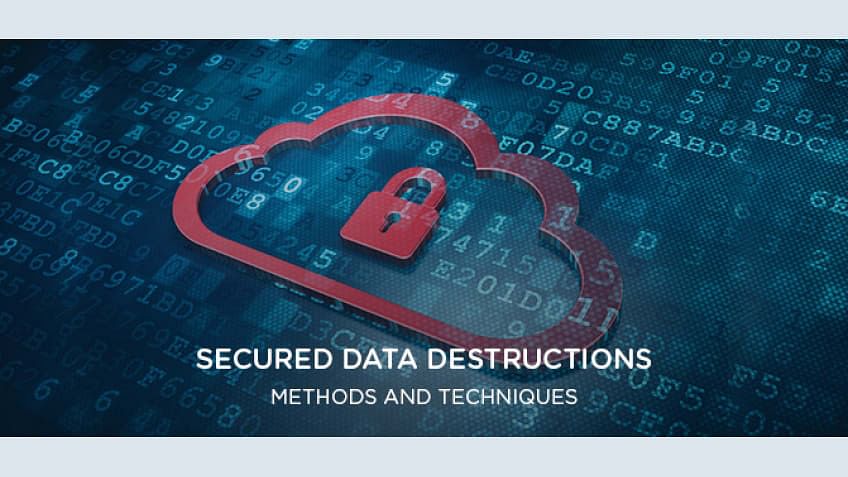The Necessary Nature of Data Damage in Upholding Computer System Safety And Security Solutions and Protecting Versus Unauthorized Access
In a period where information violations and identity burglary are progressively common, the relevance of reliable information destruction can not be overstated. Organizations has to identify that the failing to effectively deal with sensitive details postures not only lawful and economic risks however additionally a prospective disintegration of client trust fund. Various approaches, from data wiping to physical devastation, function as vital safeguards versus unapproved accessibility. However, recognizing the effects of information devastation techniques and compliance with laws elevates important concerns concerning the competence of existing methods and their long-lasting stability when faced with progressing risks.
Value of Information Destruction
In an increasingly electronic globe, the significance of information devastation can not be overstated. As companies amass substantial quantities of sensitive details, the prospective effects of stopping working to correctly manage and dispose of that data end up being increasingly serious. Information violations, identification theft, and company espionage present substantial threats, emphasizing the requirement of efficient information destruction techniques.

Additionally, as technology develops, so as well do the techniques whereby destructive stars seek to make use of sensitive information. Organizations needs to stay vigilant and proactive in their information devastation approaches to guard against these developing threats. By prioritizing information devastation, business not only secure their assets but additionally foster count on among customers and stakeholders, demonstrating a dedication to liable information monitoring and security methods.
Methods of Effective Data Destruction
To guarantee the full and irreparable devastation of sensitive data, companies can use a selection of efficient methods customized to their particular demands. Among the most usual methods is information wiping, which includes making use of specialized software to overwrite existing information numerous times, making recuperation basically impossible. This is specifically useful for solid-state drives and hard drives, where conventional deletion methods are inadequate.
An additional efficient approach is degaussing, which utilizes solid magnetic fields to disrupt the magnetic domains on storage media, providing the information irretrievable. This approach is particularly suited for magnetic storage space devices, such as disk drive and difficult disks.
Physical damage is likewise a feasible option, involving the shredding, squashing, or incineration of storage gadgets. This approach warranties that data can not be recuperated, making it perfect for companies taking care of extremely delicate details.

Conformity With Data Security Rules
Organizations must not just focus on reliable data destruction methods however also guarantee compliance with information protection guidelines that control exactly how delicate information is taken care of and dealt with. Following these policies is important for guarding individual data and maintaining customer trust fund. Regulations such as the General Data Security Policy (GDPR) in the European Union and the Health Insurance Policy Transportability and Responsibility Act (HIPAA) in the USA impose rigorous standards on data administration, which include requirements for the protected disposal of sensitive info.
To attain conformity, companies need to web carry out detailed information devastation policies that straighten with these legal structures. This consists of recognizing information that needs damage, establishing procedures for safe methodsâEUR" such as shredding physical media or utilizing software application that satisfies sector standards for information wipingâEUR" and maintaining thorough records of devastation activities. Regular audits must be performed to make certain adherence to these policies and to determine any kind of potential locations for renovation.
Failure to comply with data protection guidelines can lead to significant legal implications, including significant penalties and damages to an organization's reputation. Incorporating conformity right into data destruction methods is not just a legal responsibility however also an essential element of a durable information security method.
Effects of Poor Information Handling
Poor data handling can result in extreme repercussions that prolong beyond immediate functional setbacks. Organizations might face considerable economic losses as a result of data breaches, which frequently cause costly remediation efforts, lawful fees, and regulative fines. These monetary implications can Homepage prevent and stress sources growth, eventually impacting a company's profits.
In addition, bad information handling can badly damage an organization's track record. Consumers, partners, and stakeholders may lose rely on an entity that fails to safeguard sensitive info, causing reduced consumer loyalty and possible loss of organization chances. This disintegration of trust can take years to restore, if it can be recovered in all.
Furthermore, organizations might deal with legal implications emerging from non-compliance with data security regulations. Such offenses may lead to examinations and charges, compounding the monetary problem and more tainting the company's picture.
In the world of cybersecurity, inadequate data management practices can create vulnerabilities that make systems more vulnerable to unapproved accessibility and cyberattacks. Inevitably, these consequences emphasize the critical significance of carrying out durable data dealing with procedures to secure sensitive details and maintain business integrity.
Ideal Practices for Secure Data Disposal


First of all, information need to be identified according to its level of sensitivity. Delicate information needs much more strenuous disposal approaches, such as shredding physical documents and utilizing sophisticated software program for electronic data wiping. Using certified data devastation services makes sure compliance with market policies and criteria.
Secondly, organizations must implement a data disposal plan that mandates regular audits. This plan should detail the treatments for information retention and devastation, ensuring that outdated information is thrown away quickly and securely. Educating employees on these protocols is vital to promoting a culture of protection recognition.
Lastly, maintaining detailed records of disposed information boosts accountability and provides a clear audit Related Site path. This documents must consist of the kind of information destroyed, the technique utilized, and the date of disposal.
Conclusion
To conclude, the imperative of efficient data destruction appears in its role in enhancing computer system security services and reducing unauthorized access threats. Embracing robust methods such as data cleaning, degaussing, and physical destruction, along with compliance with regulations like GDPR and HIPAA, is important for protecting delicate information. Ignoring appropriate data disposal techniques can lead to extreme effects, including information breaches and legal consequences. Executing ideal practices in protected data disposal ultimately strengthens organizational honesty and customer trust.
In a period where information breaches and identification theft are increasingly common, the value of effective information destruction can not be overstated. data destruction. Data breaches, identification burglary, and company espionage position considerable dangers, highlighting the necessity of effective information damage techniques
Conformity with policies such as GDPR and HIPAA requireds that organizations apply stringent data defense measures, including the protected damage of information at the end of its lifecycle.
By focusing on data damage, business not only shield their properties yet additionally foster trust among stakeholders and clients, demonstrating a commitment to accountable information management and safety and security practices.
Organizations should not only concentrate on reliable data destruction methods but also ensure compliance with data defense regulations that control how sensitive information is dealt with and disposed of.